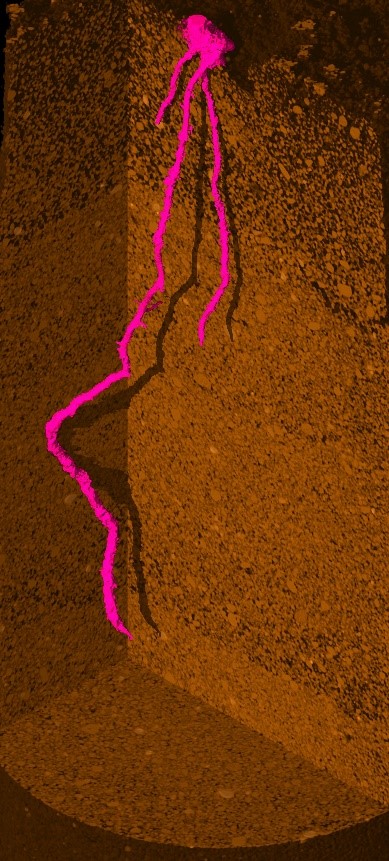An international team of scientists has discovered how to design cereal roots that are able to continue growing in hard soils by altering their ability to penetrate. This enables roots to access sources of water deeper in soil, and helps to ‘climate-proof’ vital crops in response to changing global rain fall patterns.


New understanding of root penetration
Discovery of new signals regulating roots to penetrate hard soils could help climate proof crops

3D image generated from X-ray scans of crop roots, which helped find that root swelling is regulated by hormones.
Image: Dr. Bipin Pandey, University of Nottingham, UK
Climate change is altering rain fall patterns, resulting in both wetter and drier but harder soils, which threaten yields in rain fed crops like cereals. A team of researchers led by the Universities of Nottingham and Shanghaihave discovered key genes, hormone signals and processes in rice roots that control their ability to penetrate hard soils. The international team includes researchers from the UK, USA, Netherlands, Germany, Czech Republic and China. Junior Professor Dr. Sjon Hartman from the Cluster of Excellence CIBSS - Centre for Integrative Biological Signalling Studies at the University of Freiburg, contributed to the study. Their findings have been published today in the scientific journal Proceedings of the National Academy of Sciences.
Ethylene influences root swelling
Hard soils cause plant roots to accumulate the plant hormone ethylene, in turn causing them to grow shorter and swell. Root swelling was originally thought to help penetrate hard soils. However, X-ray imaging of plants growing in soil at Nottingham showed that roots which remained narrow penetrate hard soils more easily. The team went on to identify a hormone signal that promoted this root swelling response which, when its levels were reduced, helped roots remain narrow and penetrate hard soil more effectively.
Longstanding scientific understanding overturned
Dr. Bipin Pandey, BBSRC Discovery Fellow and the lead researcher from the University of Nottingham says “Our research overturns decades of scientific thinking, revealing that root swelling does not help penetrate hard soils.” He believes that these results can potentially safeguard or boost agricultural yields worldwide, particularly considering that climate change can exacerbate the strength of soil by less rainfall. This new understanding of how roots grow in hard soils promises to help develop novel soil-compaction-resistant crops.
Hartman is convinced that the new study paves the way for understanding how plants use the hormone ethylene to sense water extremes: “Ethylene is used by plants to sense both flooding and soil compaction. It will be interesting to uncover how plants can tell the difference between these 2 situations, and still respond appropriately.” Untangling how plant roots respond to each stress is important in order to develop more tolerant crops that can thrive in both situations.
CIBSS-Profile of Jun.-Prof. Dr. Sjon Hartman
Original publication:
Huang, G., Kilic, A., Karady, M., Pandey, B. K. (2022): Ethylene inhibits rice root elongation in compacted soil via ABA- and auxin-mediated mechanisms. In: PNAS. DOI: https://doi.org/10.1073/pnas.2201072119



